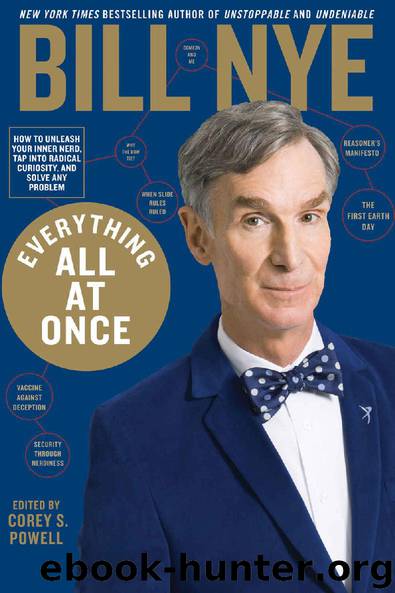Everything All at Once: How to unleash your inner nerd, tap into radical curiosity, and solve any problem by Bill Nye & Corey S. Powell

Author:Bill Nye & Corey S. Powell [Nye, Bill]
Language: eng
Format: epub, mobi
Publisher: Rodale
Published: 2017-07-11T06:00:00+00:00
One of the biggest roadblocks to getting the message out is doubt. Here, too, I draw inspiration from Carl Sagan. I often hear people use the words “skepticism” and “denial” interchangeably (especially among those who refuse to acknowledge climate change), but these two words are worlds apart. Skepticism is a discipline. It’s a component of critical thinking that helps to keep you from fooling yourself or allowing yourself to be fooled; Sagan wanted us all to carry a “baloney detection kit.” Denial, on the other hand, is like a lock on the tool kit that keeps you from thinking about ideas you don’t like.
The professional denial business pretty much started with cigarette companies. Tobacco companies hired scientists who were careful to say that they couldn’t be 100 percent sure about anything having to do with cancer and cigarettes. They explained that it’s their business to develop hypotheses and continually question accepted truths. The denial community exploited that aspect of scientific inquiry in an amazingly deceptive way: If there’s a 5 percent chance that your friend’s lung cancer was not caused by cigarettes, they’d say, then you can’t prove that cigarette smoking is dangerous. They twisted nerd honesty to their own ends. The underlying message was: focus only on the doubt and don’t think too much. It is a way to prevent people from making otherwise obvious connections.
There must always be uncertainty in science, so there are always these kinds of vulnerabilities. It’s not just climate change; there’s also the opposition to vaccination, the irrational fears about genetically modified organisms (GMOs), all the way up and out to those on the fringe who think the Moon landings were faked. The way we will get past all these manufactured doubts is by exposing people to some important critical-thinking skills. In this example, consider how difficult it would be for landing-fakers just to create all the paperwork that the space program generated. That alone would have been more trouble than landing on the Moon! Critical thinkers can recognize when they are being deceived or manipulated. I urge you to promote critical thinking and practice it every chance you get. Set it out into the world and help it spread. I was lucky to grow up in a family that treated the scientific method as the normal, everyday way to think through problems. Not everyone is so fortunate.
Perhaps it was easier during the Cold War, when Carl Sagan was researching and I was growing up. Back then, embracing science felt like a matter of life or death, because research led to remarkable new weapons. A sense of crisis forced people to put differences aside. Today, science and technology are more advanced than ever, but many of us often fall into the traps of apathy and doubt. It falls heavily on us nerds to rekindle a sense of shared purpose and common benefit. Commitment to spending on science and technology requires public support. Progress requires collective investment of our intellect and treasure—brains and money. This
Download
Everything All at Once: How to unleash your inner nerd, tap into radical curiosity, and solve any problem by Bill Nye & Corey S. Powell.mobi
This site does not store any files on its server. We only index and link to content provided by other sites. Please contact the content providers to delete copyright contents if any and email us, we'll remove relevant links or contents immediately.
Big Magic: Creative Living Beyond Fear by Elizabeth Gilbert(5754)
Paper Towns by Green John(5177)
On Writing A Memoir of the Craft by Stephen King(4931)
The Doodle Revolution by Sunni Brown(4752)
Hyperfocus by Chris Bailey(4110)
Evolve Your Brain by Joe Dispenza(3671)
Unlabel: Selling You Without Selling Out by Marc Ecko(3658)
The Red Files by Lee Winter(3411)
Draw Your Day by Samantha Dion Baker(3352)
The Power of Mindful Learning by Ellen J. Langer(3220)
The Art of Dramatic Writing: Its Basis in the Creative Interpretation of Human Motives by Egri Lajos(3058)
The War Of Art by Steven Pressfield(2952)
Applied Empathy by Michael Ventura(2890)
The 46 Rules of Genius: An Innovator's Guide to Creativity (Voices That Matter) by Marty Neumeier(2840)
How to be More Interesting by Edward De Bono(2789)
Keep Going by Austin Kleon(2755)
Why I Am Not a Feminist by Jessa Crispin(2747)
How to Stop Worrying and Start Living by Dale Carnegie(2712)
You Are Not So Smart by David McRaney(2644)
